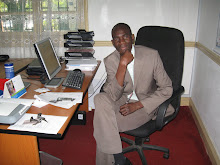
- Uma nova economia global multipolar requer um novo enfoque.
O antigo conceito de “Terceiro Mundo” já não se aplica mais à nova economia global multipolar e é necessário um novo enfoque para levar em conta os interesses dos países em desenvolvimento, afirma Robert B. Zoellick, Presidente do Grupo Banco Mundial.
Em discurso antes das Reuniões da Primavera Setentrional do Banco Mundial, Zoellick afirmou que a crise econômica global de 2009 e o surgimento de países em desenvolvimento na economia global foram o dobre de finados do antigo conceito de Terceiro Mundo como entidade separada, tal como 1989 foi o fim do Segundo Mundo do Comunismo. Isso tem profundas implicações para o multilateralismo, acção cooperativa global, relacções de poder, desenvolvimento e instituições internacionais, tais como o Grupo Banco Mundial, e implica enfocar os problemas sob uma nova perspectiva.
“Há décadas os estudiosos da segurança e política internacional vêm debatendo o surgimento de um sistema multipolar. É chegado o momento de reconhecer um novo paralelo econômico. Se 1989 presenciou o fim da ‘Segunda Guerra’ com o desaparecimento do comunismo, 2009 viu o fim do que era conhecido como o ‘Terceiro Mundo’. Estamos agora em uma nova economia mundial multipolar e em rápida evolução”, disse Zoellick em discurso no Woodrow Center for International Scholars em Washington, D.C., no qual lembrou aos presentes que alguns consideraram as ações do ex-Presidente dos Estados Unidos como uma oportunidade perdida. “Não podemos dar-nos ao luxo de continuar a geopolítica costumeira.
A pobreza continua e deve ser enfocada. Estados fracassados permanecem e devem ser enfocados. Os desafios globais se estão intensificando e devem ser enfocados. Mas a maneira de enforcarmos estas questões está mudando”, afirmou Zoellick. “As categorizações ultrapassadas de Primeiro e Terceiro Mundos, doadores e suplicantes, dirigentes e dirigidos, não se enquadram mais.”
Embora a pobreza e os Estados frágeis tenham persistido como desafios a superar, os países em desenvolvimento cresceram a ponto de representar uma parcela cada vez maior da economia global e proporcionar uma importante fonte de demanda na recuperação da recente crise econômica global. Isso ocorreu não somente na China e na Índia, mas também no Sudeste asiático, América Latina e Oriente Médio. A África poderá também um dia tornar-se um polo do crescimento global. Zoellick observou que, portanto, os países em desenvolvimento merecem maior reconhecimento na gestão do sistema global e que as soluções propostas em matéria de regulamentação financeira, mudança climática e gestão de crises devem refletir seus interesses. É importante reconhecer as implicações da nova economia mundial multipolar para a cooperação multilateral e resistir às forças gravitacionais que estão trazendo um mundo de Estados-nação de volta à busca de interesses mais estreitos, disse Zoellick.
O poder traz responsabilidade. Os países em desenvolvimento precisam reconhecer que agora fazem parte da arquitetura global”, afirmou Zoellick.
Como consequência do enorme prejuízo causado pela ruptura do sistema financeiro, é evidente que o mundo precisa de uma melhor regulamentação financeira, com padrões melhores e mais sólidos de capital, liquidez e supervisão, disse Zoellick. “No entanto, devemos acautelar-nos contra consequências não premeditadas”, advertiu. “Não devemos aumentar os custos incentivando o protecionismo financeiro ou restringindo injustamente os serviços financeiros às pessoas de baixa renda. As regulamentações acordadas em Bruxelas, Londres, Paris ou Washington poderiam funcionar para os grandes bancos no mundo desenvolvido. Mas o que dizer a respeito de bancos menores, quer estejam em países desenvolvidos ou em desenvolvimento?”
A mudança climática representa outro desafio no qual o enfoque de “tamanho único” imposto pelo mundo desenvolvido não funciona para os países em desenvolvimento, disse Zoellick. “A política de mudança climática pode estar vinculada ao desenvolvimento e conseguir o apoio dos países em desenvolvimento para o crescimento com baixa emissão de carbono – mas não se for imposta como camisa de força”, disse ele. “Os países em desenvolvimento precisam de apoio e financiamento para investir em vias de crescimento mais limpo. Um bilhão e seiscentas mil pessoas carecem de acesso à eletricidade. Embora tenhamos de cuidar do meio ambiente, não podemos destinar as crianças africanas a fazerem o dever de casa à luz de vela ou negar a trabalhadores africanos empregos no setor manufatureiro. O desafio é apoiar transições para uma energia mais limpa sem prejudicar o acesso, produtividade e crescimento que podem tirar da pobreza centenas de milhares de pessoas.”
Uma terceira área em que o antigo pensamento não se aplica e na qual se deve atribuir maior consideração aos interesses dos países em desenvolvimento é a resposta às crises econômicas. “Em um mundo em transição, o perigo é o fato de os países desenvolvidos focarem as cúpulas de sistemas financeiros ou se concentrarem na má gestão dos países desenvolvidos, como é o caso da Grécia, disse Zoellick. “Ouvir o ponto de vista dos países em desenvolvimento não é mais simplesmente uma questão de caridade ou solidariedade: É uma questão de autointeresse. Esses países em desenvolvimento são agora fontes de crescimento e importadores de bens de capital e serviços dos países desenvolvidos.”
As mudanças na economia global e no sistema multilateral têm implicações significativas para o Banco Mundial, afirmou Zoellick. O desenvolvimento deixou de ser Norte-Sul e passou a ser Sul-Sul e Sul-Norte. O Banco Mundial deve adotar uma política de reforma constante, mudando para adaptar-se a circunstâncias em rápida evolução, a fim de melhor atender aos interesses das pessoas de baixa renda no mundo em desenvolvimento. Em sua reunião na primavera setentrional a instituição espera anunciar uma mudança que dê aos países em desenvolvimento pelo menos 47% das ações com direito a voto, juntamente com o primeiro aumento depois de mais de 20 ano de seu capital, o que fortalecerá um balanço que permitiu destinar mais de US$ 100 bilhões à assistência financeira desde julho de 2008. Isso será acompanhado do programa de reforma mais abrangente na história da instituição, desde maior acesso à informação a melhorias nas políticas creditícias.
Lembre-se que o conceito do Terceiro Mundo foi inventado pelo demógrafo Francês Albert Sauvy, em 1952.

